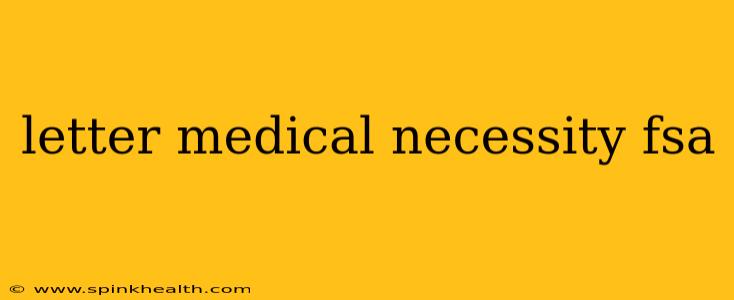The world of Flexible Spending Accounts (FSAs) can feel like a maze, especially when it comes to securing reimbursement for medical expenses. That crucial piece of the puzzle? The Letter of Medical Necessity. It's the key that unlocks reimbursement for many otherwise ineligible expenses. But crafting a persuasive letter isn't just about ticking boxes; it's about telling a compelling story—your story—that convinces the FSA administrator that your expense is truly medically necessary.
This isn't your average form-filling exercise. This is about clearly demonstrating the link between your medical condition, the specific treatment or product, and the necessity of that treatment for your health and well-being. Let's unravel this process step-by-step, addressing common questions and concerns along the way.
What is a Letter of Medical Necessity?
A Letter of Medical Necessity (LMN) is a formal document from your doctor (or other licensed medical professional) that explains why a particular medical expense is necessary for your diagnosis, treatment, or management of a specific health condition. It's your advocate in the process, justifying the cost to your FSA provider.
Think of it as a bridge connecting your medical needs to your FSA reimbursement. Without it, your claim might be denied, leaving you to shoulder the expense yourself.
What Information Should My Letter of Medical Necessity Include?
This is where precision meets persuasion. A poorly written LMN can sink your claim faster than a lead balloon. Here's what your doctor's letter should ideally contain:
- Patient Information: Your full name, date of birth, and contact information.
- Diagnosis: A clear and concise description of your diagnosed medical condition. Use precise medical terminology.
- Treatment Plan: A detailed explanation of your treatment plan, including the necessity of the specific product or service you're seeking reimbursement for.
- Justification: This is the heart of the letter. Your doctor needs to clearly articulate why the requested item or service is essential to your treatment. This shouldn't be a generic statement; it should be specific to your case.
- Alternatives Considered: Mention any alternative treatments considered and why they were deemed unsuitable for your specific situation. This demonstrates thoroughness and strengthens your case.
- Expected Outcomes: Briefly describe the expected positive outcomes of the treatment or product.
- Provider Information: Your doctor's name, address, contact information, medical license number, and signature.
- Date: The date the letter was written.
What if My Doctor Refuses to Write a Letter of Medical Necessity?
This is a frustrating scenario but not insurmountable. First, understand why your doctor is hesitant. Is there a lack of clear evidence linking the expense to your condition? Is it a matter of their administrative workload? Have an open and honest conversation with your doctor to address their concerns and collaboratively develop a solution.
If a direct conversation fails, consider seeking a second opinion from another physician who is more familiar with your condition and the specific treatment you are seeking.
What Types of Expenses Typically Require a Letter of Medical Necessity?
Many FSA plans require an LMN for certain expenses. These often include:
- Durable Medical Equipment (DME): Wheelchairs, CPAP machines, walkers, etc.
- Prescription Medications: While many are automatically covered, some specialty medications might require additional documentation.
- Over-the-Counter (OTC) Medications: Unless your plan specifically covers OTC items, an LMN might be necessary, particularly for chronic conditions.
- Medical Devices: Such as insulin pumps or blood glucose monitors.
- Other Specialized Medical Supplies: Depending on the nature and cost of the item, an LMN might be requested.
How Can I Make Sure My Letter of Medical Necessity is Strong?
A strong LMN is clear, concise, and persuasive. It avoids ambiguity and focuses on the direct connection between your medical needs and the expense. Before submitting it, carefully review it with your doctor to ensure all necessary information is included and accurately reflects your medical situation.
Can I Use a Template for My Letter of Medical Necessity?
While you might find templates online, avoid simply filling in the blanks. A generic template is unlikely to effectively convey the specifics of your case. Your doctor needs to write a tailored letter reflecting your unique medical history and treatment plan.
Navigating the world of FSA reimbursements can be complex, but with a well-written Letter of Medical Necessity, you'll significantly increase your chances of successful reimbursement. Remember, this isn't just about the paperwork; it's about ensuring your healthcare needs are met and that your FSA benefits are used effectively.

